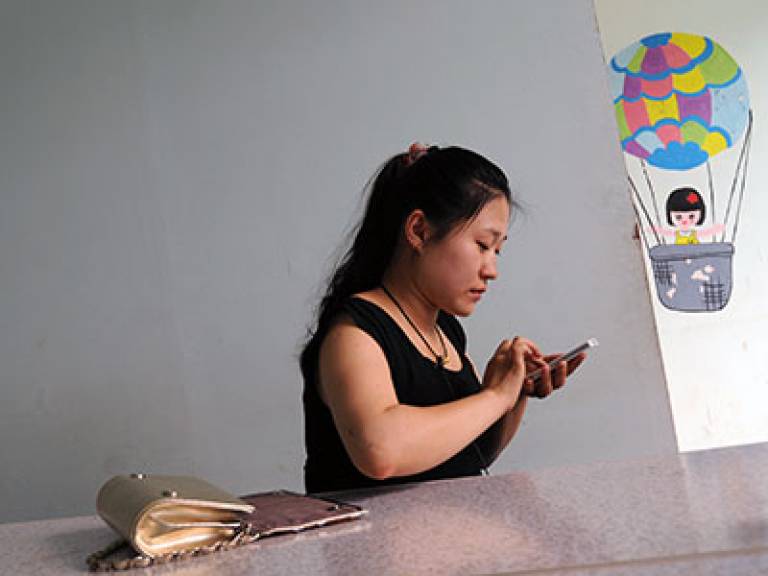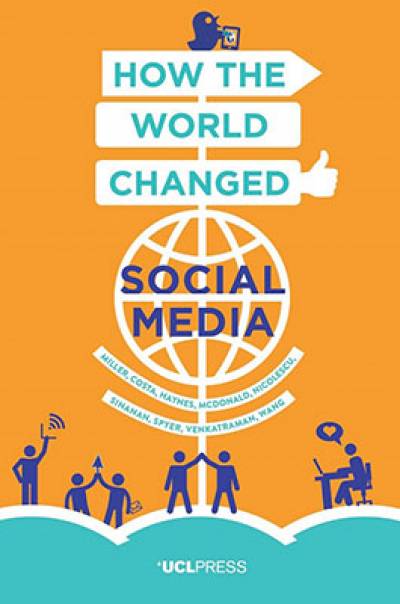The world's social media habits uncovered in new UCL study
29 February 2016
What are the big themes explored in 'Why We Post' - a global social media research project carried out by a team of UCL anthropologists, launching today?

Why do we post selfies in England and footies in Chile? Why is social media considered a distraction to education in rural China, yet a valuable learning aid in Brazil? And how quintessentially English are we when it comes to our social media activity? These are some of the big themes explored in 'Why we post'.
The landmark project saw nine UCL anthropologists each spend 15 months living in eight countries* in communities as varied as an English village, a factory town in North China, and a community on the Turkish-Syrian border.
Each team member conducted in-depth analysis into how the local populations behave and interact across social media channels and how these platforms are impacting on the way we live our lives, with the findings available via a dedicated website, an e-learning course and 11 Open Access books.
Some of the study's key conclusions include:
- Social media is seen as enhancing education by low-income families , and hindering education by high-income families
- Contrary to popular belief, social media is not making us more individualistic or narcissistic - it is in fact reinforcing our sense of family and community
- Selfies look different around the world: people take 'footies' in Chile, selfies, 'groupies' and 'uglies' in the UK, and more traditional selfies in Italy and Brazil. In China selfies are popular among young men, whereas in India and on the Turkish-Syrian border they are seen as too informal for the formal space of social media
- Social media is having a profound impact on gender politics around the world, especially in highly conservative societies such as in Muslim Turkey where for the first time young women and men can have sustained and direct contact with each other, often through the use of fake accounts
- Public social media platforms are more conservative than private ones: public-facing social media platforms, such as Facebook, tend to be conservative, and in many of the team's research sites people avoid political postings here. By contrast more private social media, such as WhatsApp, may be used to facilitate (sometimes radical) social change
- Social media is serving local purposes around the world, rather than being used in the same way everywhere: personal style as portrayed on social media becomes more conformist in Italy and less conformist in Trinidad
- Equality online often does not translate to equality offline: In Brazil household employees may have the same smartphones as their employers, but that doesn't lead to employers `friending them', while in Turkey women can achieve more freedom online, where they can participate in activities away from the gaze of their families, but this has not led to more gender equality offline
- Memes are now the moral police of online life: memes range from more serious, religious themes in India, to the humorous as with parody and jokes about politicians in Trinidad. But in both cases, memes often assert one set of values and criticise others. People who might be shy about expressing their own values and opinions often use memes instead
- We tend to assume social media is a threat to privacy, but sometimes it can increase privacy: in most regions there is considerable anxiety about the threat to privacy posed by social media. But some of the largest populations in East and South Asia live in extended families with limited expectations of individual privacy. For them social media can be their first experience of this kind of privacy
- It's the people who use social media who create it, not the developers of platforms: content such as school pupils banter, funny videos, and shared baby photos come from users, not the creators of platforms, and genres often migrate happily across very different platforms

The results of the project are being unveiled on UCL's 'Why We Post' website today (29th February), with over 100 videos and 15 key findings as well as via a free e-learning course in English on FutureLearn, at and in seven other languages at UCL Extend.
The first three of 11 free books outlining the findings of the project are also available now from UCL Press.
Professor Daniel Miller (UCL Anthropology), who spearheaded the project, commented: "It is surprising how little we knew about how ordinary people all around the world use social media and the extraordinary consequences it is having on their lives."
*The eight countries studied as part of the project were: England, Turkey, Italy, Chile, Brazil, China (with one field site in a Chinese factory town and one in a Chinese village), India and Trinidad.
View images from the project fieldsites:
Links
Media contact
Ruth Howells
Tel: +44 (0)20 3108 3845
Email: ruth.howells[at] ucl.ac.uk
 Close
Close

